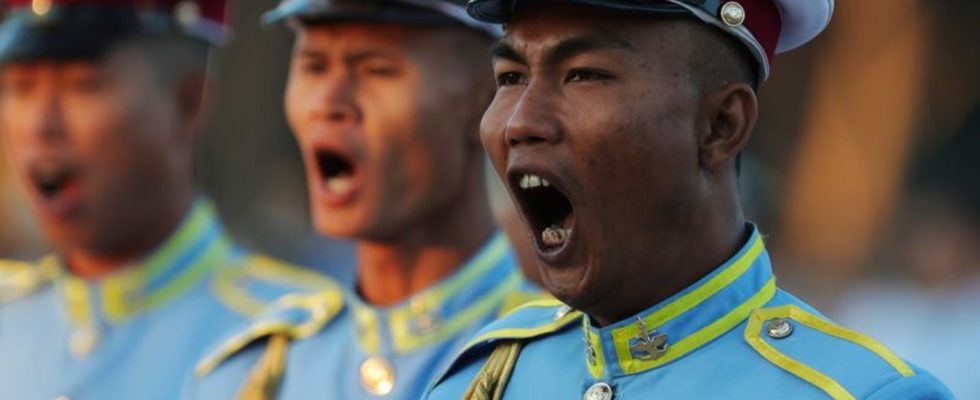The military council in Myanmar had already decided on compulsory military service in 2010 – but the law was never put into effect. Until now. Fear is rampant in the crisis country.
Doe Doe is only 19 years old, but in his young life he has already had to make difficult and momentous decisions. When the military seized power in his home country of Myanmar in 2021, he dropped out of school shortly before his planned graduation. He did not want to submit to a school system controlled by the junta. Now that the generals have announced that they will enforce a previously inactive law on conscription, he has joined the “People’s Defense Forces” (PDF) in the city of Mandalay, which is fighting the army in many parts of the country.
“I didn’t tell my parents anything about it,” he told the German Press Agency on the phone. “Now I’m taking part in combat training here – it’s time we finally defend ourselves.” Even as he speaks, fighter jets can suddenly be heard dropping bombs. Screams can be heard through the phone.
Consequences of the planned compulsory recruitment
The military in Myanmar has been fighting mercilessly against its own people since the overthrow and removal of Nobel Peace Prize winner Aung San Suu Kyi from power. It’s no surprise that the planned compulsory recruitment has triggered a mass exodus. Many people are panicking. They fear that they will soon be drafted from their homes into military service and then have to fight for the hated Tatmadaw, as the armed forces are called in the former Burma – against all their beliefs.
Because the military, which is now considered weakened, lacks young volunteers. The army has suffered heavy losses in recent months because armed militias are increasingly gaining the upper hand in many parts of the country.
There was particularly fierce fighting at the end of last year in northern Shan State on the border with China, a region known for drug trafficking and gambling and considered a lawless region. Within a few days, the so-called Brother Alliance – a guerrilla alliance made up of three ethnic groups – had gained control of important trade routes to China as well as more than 180 bases and outposts.
Introduction of compulsory military service in April
Compulsory military service is due to come into force in April. Men between the ages of 18 and 45 and women between the ages of 18 and 35 should be drafted for at least two years. Certain professionals, such as doctors and engineers, even have to serve in the military for three years. According to the law, military service can also be extended to five years. Anyone who refuses could face several years in prison.
According to the military, the law affects around 14 million citizens: 6.3 million men and 7.7 million women. Myanmar has a total population of around 55 million. Initially, around 5,000 people are to be drafted into military service every month.
Tens of thousands of people, especially young people, are currently trying to leave their homeland – including for Cambodia or Laos. But most people want to go to Thailand. Because there are many relatives and friends in the neighboring country who had already fled to the neighboring country during the coup.
Long queues for exit papers
Long queues have been forming for days in front of the visa office of the Thai embassy in the former capital Yangon (formerly: Rangoon) and other authorities. In Mandalay, two women were recently killed in a mass panic in front of the passport office. Others set out to cross the border illegally.
One of them is 27-year-old Kyaw Kyaw. Before the coup, he worked in a state-owned bank. Most recently he was a teacher at a private boarding school in Myitkyina, the capital of northern Kachin State on the border with China. When he refused to work for the military and instead joined the Civil Disobedience Movement (CDM) protest, his passport was confiscated. He therefore cannot legally leave the country.
To avoid military service, Kyaw Kyaw has now fled to the border area between Myanmar and Thailand, which is controlled by the powerful Karen National Union (KNU). The KNU is the oldest armed group in the multi-ethnic state of Myanmar. It has been fighting for freedom for more than 70 years and has offered protection to many internally displaced people since the coup.
“I no longer felt safe in Myitkyina because the authorities were looking for me,” says Kyaw Kyaw. “That’s why I decided to escape. I don’t want to fight for the military.” Now the young man wants to try to get illegally to Mae Sot in Thailand on the other side of the border and start a new life there.
Like so many others, he ignores warnings from Thai Prime Minister Srettha Thavisin, who threatened illegal refugees from Myanmar with legal action – no wonder, given the alternative that awaits him at home. “Signs of desperation such as the imposition of conscription do not indicate that the junta and its forces pose a lesser threat to the people of Myanmar,” warned the UN special rapporteur on Myanmar, Tom Andrews. In fact, many are now exposed to even greater dangers.
Reports of military abuse
According to the UN, there are reports that the military is already kidnapping young people and forcing them to work as porters – or even using them as human shields. “We are constantly afraid. We don’t dare go out on the streets at night,” said a 35-year-old graphic designer from Yangon.
Meanwhile, Doe Doe hopes that he might be able to graduate from school at some point. “I am convinced that we will win in the end. Everyone here believes that,” he says. “The junta cannot deal with us like this, the people will fight back.”

